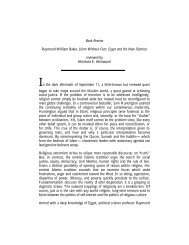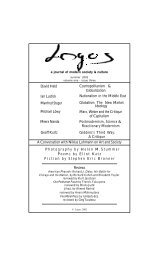Michael J. Thompson Stephen Eric Bronner Wadood Hamad - Logos
Michael J. Thompson Stephen Eric Bronner Wadood Hamad - Logos
Michael J. Thompson Stephen Eric Bronner Wadood Hamad - Logos
You also want an ePaper? Increase the reach of your titles
YUMPU automatically turns print PDFs into web optimized ePapers that Google loves.
Jason Schulman<br />
Educational Dictatorship of benevolent anti-capitalists. Owen was also elitist,<br />
but Muravchik is considerably easier on him because he was a nonrevolutionary<br />
who “recognized that there was no need to seize power.<br />
Endowed with some land and capital, socialists could form their own<br />
communities.” Commenting on the failure of Owen’s utopian society, New<br />
Harmony—and, later in the book, the Israeli kibbutzim—Muravchik offers<br />
the traditional “socialism goes against human nature” canard: “If men were<br />
angels then an economy might succeed without selfish incentives, but if men<br />
were angels it would not matter whether the economy succeeded since they<br />
would have no material needs.” Whatever relevance this may have to the<br />
socialism of utopian colonists, it is irrelevant as a critique of political<br />
democratic socialism, which has always acknowledged the importance of<br />
“selfish” incentives under conditions of (relative) scarcity. Men and women<br />
are indeed not angels, and among capitalism’s problems is that it encourages<br />
them to be devils: the market encourages every individual to regard and treat<br />
all others as means to earn his or her living, just as it compels every firm to<br />
act as if it were the center of the universe, never mind the “externalities.”<br />
Muravchik’s analysis of Marx and Engels similarly lacks depth. Besides<br />
attributing the phrase “property is theft” to “Marxism”—it was the anarchist<br />
forefather Pierre Joseph-Proudhon who coined it—he rehashes the<br />
controversy of Marx’s use of anti-Semitic language, specifically the stereotype<br />
of Jews as merchant-hucksters. Muravchik fails to mention that the language<br />
of Part II of Marx’s On the Jewish Question followed the view of the Jews’ role<br />
given in an essay On the Money System which had just been written by Moses<br />
Hess, one of the progenitors of Zionism. Subsequent Zionists used similar<br />
phraseology. 1 Marx supported legal equality and civil rights for Jews; his<br />
analysis was that Jews were essentially a commercial class within medieval<br />
Europe, and the Jewish religion was an ideology reflecting the outlook of this<br />
class. While it is certainly true that Marx wrote terrible things in his personal<br />
letters to Engels, such as his derision of German socialist leader Ferdinand<br />
Lassalle as a “Jewish nigger,” even as he publicly opposed black slavery in the<br />
United States, this merely proves that Marx was, in fact, a nineteenth century<br />
European. There was nothing anti-Semitic in the politics of Marx and<br />
Engels—unless one considers atheism to be objectively anti-Semitic, and even<br />
then, Marx opposed the attempt by Mikhail Bakunin and his followers to<br />
make atheism an official doctrine of the International Workingmen’s<br />
Association. Whatever Marx’s personal failings, the movement that took his<br />
name was in no way anti-Semitic. August Bebel famously attacked anti-<br />
Semitism as “the socialism of fools”; Karl Kautsky denounced New<br />
<strong>Logos</strong> 2.3 – Summer 2003




